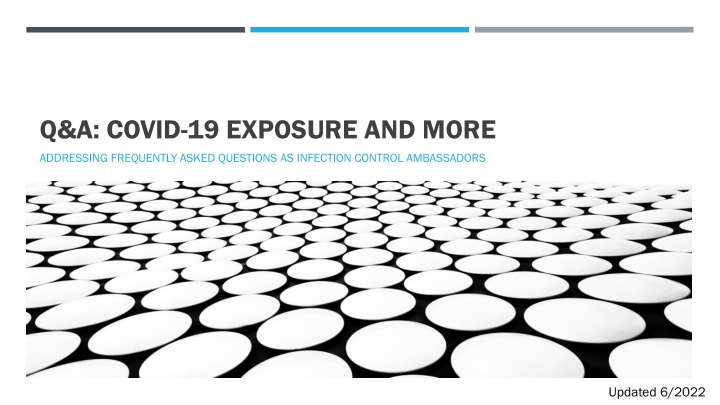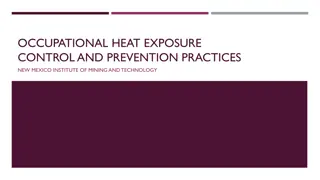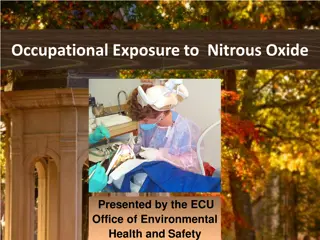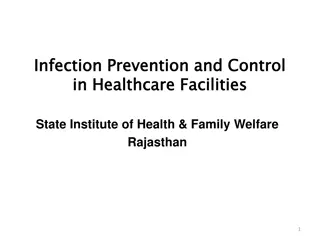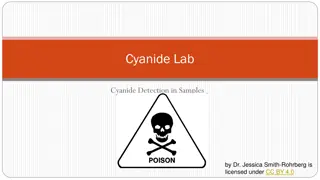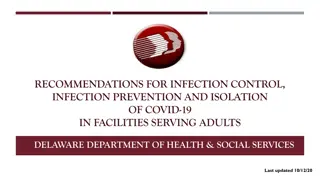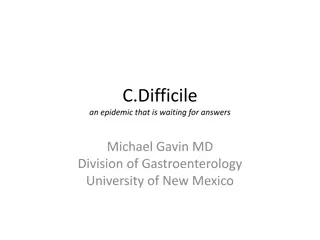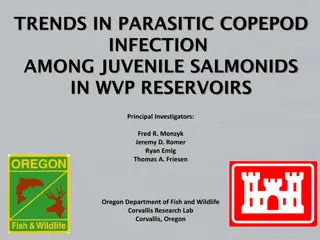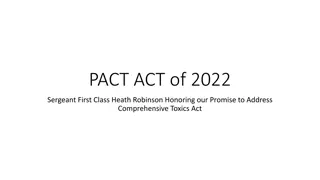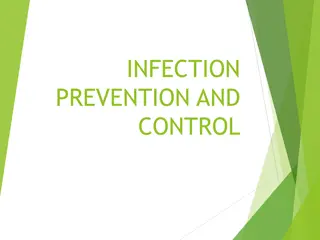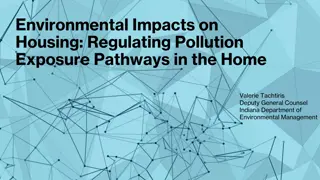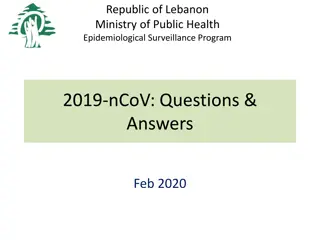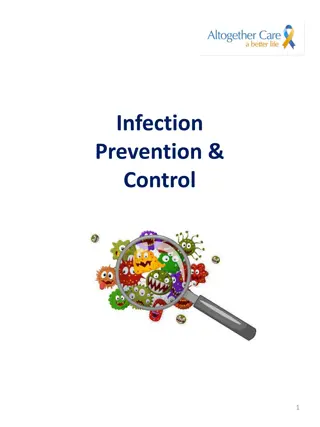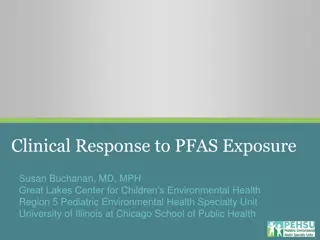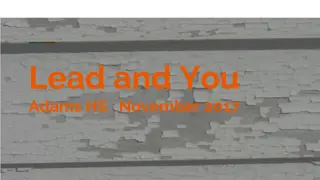COVID-19 Exposure and Infection Control FAQs
COVID-19 is primarily spread through respiratory droplets and direct contact with infected individuals or surfaces. Learn about high, low, and third-party exposure risks, return-to-work guidelines for healthcare personnel, and more.
Download Presentation

Please find below an Image/Link to download the presentation.
The content on the website is provided AS IS for your information and personal use only. It may not be sold, licensed, or shared on other websites without obtaining consent from the author.If you encounter any issues during the download, it is possible that the publisher has removed the file from their server.
You are allowed to download the files provided on this website for personal or commercial use, subject to the condition that they are used lawfully. All files are the property of their respective owners.
The content on the website is provided AS IS for your information and personal use only. It may not be sold, licensed, or shared on other websites without obtaining consent from the author.
E N D
Presentation Transcript
Q&A: COVID-19 EXPOSURE AND MORE ADDRESSING FREQUENTLY ASKED QUESTIONS AS INFECTION CONTROL AMBASSADORS Updated 6/2022
A: Per the CDC, COVID-19 is mostly spread by respiratory droplets released when people talk, cough, or sneeze. It is thought that the virus may spread to hands from a contaminated surface and then to the nose or mouth, causing infection. Q: HOW IS Q: HOW IS COVID COVID- -19 TRANSMITTED? TRANSMITTED? 19 It may be possible that a person can get COVID-19 by touching a surface or object that has the virus on it and then touching their own mouth, nose, or eyes. However, this is not thought to be the main way the virus spreads.
High Risk Exposure Direct contact with a person who tested positive for COVID-19. Examples: ICU vent, body fluids: saliva/mucous/phlegm. Being within 6 feet of an individual with COVID-19 for a prolonged period of time without a facemask. Q: WHAT DOES Q: WHAT DOES HIGH HIGH- -RISK, LOW RISK, LOW- - RISK, AND THIRD RISK, AND THIRD- - PARTY EXPOSURE PARTY EXPOSURE MEAN? MEAN? Having unprotected direct contact with infectious secretions of the individual - ex: being coughed on, touching used tissue with bare hands. Low Risk Exposure Being in the same room as a person who tested positive for COVID-19, while wearing a facemask, practicing social distancing (6+ feet) and not in close contact for an extended period of time. Third-Party Exposure Third-party exposure is a form of low-risk exposure. Typically, it will involve being exposed to someone who was exposed to a confirmed positive.
RETURN TO WORK FOR HEALTHCARE PERSONNEL WITH SARS RETURN TO WORK FOR HEALTHCARE PERSONNEL WITH SARS- -COV OR EXPOSURE OR EXPOSURE COV- -2 INFECTION 2 INFECTION EXPOSURE EXPOSURE IF YOU ARE SICK IF YOU ARE SICK - - COVID COVID- -19 POSITIVE OR NEGATIVE 19 POSITIVE OR NEGATIVE Health Care Providers/Direct Care Health Care Providers/Direct Care No symptoms No symptoms Health Care Provider/Direct Care Support Health Care Provider/Direct Care Support Continue working No Onsite Work No Onsite Work Wear masks always Health Care Providers/Direct Care Self Isolate: 5 Days w/routine follow-up. If significant reduction in symptoms without medication for 24hours may return following all IC protocols. Social distancing 6 Taking all precautions: wash hands, use of sanitizer NON NON- -Direct Care Support/Admin ONLY Direct Care Support/Admin ONLY Non Non- -Direct Care/ Adm ONLY Direct Care/ Adm ONLY No Symptoms No Symptoms No Onsite Work No Onsite Work Continue working Non-Direct Care/Admin ONLY Self Isolate: 5 Days w/routine follow-up. If significant reduction in symptoms without medication for 24hours may return following all IC protocols. Wear masks always Social distancing 6 Taking all precautions: wash hands, use of sanitizer *Test *Test- -based strategy is no longer recommended to determine when to allow HCP to based strategy is no longer recommended to determine when to allow HCP to return to work. return to work. IF YOU ARE SICK, DO NOT COME TO WORK!
Q: DO I NEED TO SELF Q: DO I NEED TO SELF- -ISOLATE IF I AM EXPOSED? EXPOSED? ISOLATE IF I AM A: Staff should only self-isolate if they are symptomatic, at which you would notify the Infection Control Team & your direct supervisor. Given that we have transitioned to symptom-based strategies we are no longer requiring testing. The Infection Control Team should be notified if you are experiencing any sign & symptoms of COVID-19.
A: You will take the following steps: Q: WHAT STEPS DO I TAKE WHEN I FIND OUT A STAFF MEMBER HAS A SUSPECTED OR CONFIRMED EXPOSURE TO COVID-19? Notify Infection Control Hotline, employee s supervisor and Human Resources. 1. Ensure that affected staff understands the importance of wearing a mask. 2. Complete an EMS form for any suspected or confirmed cases of exposure. 3. The IC Hotline and HR will inform staff and their direct supervisors if they are to be sent home. It is likely staff will have to self-isolate only if they are sick. 4.
Q: WHAT SHOULD I TELL MY STAFF IF THEIR PEER HAS A POSITIVE TEST Q: WHAT SHOULD I TELL MY STAFF IF THEIR PEER HAS A POSITIVE TEST OR POSSIBLE EXPOSURE? SHOULD I BE THE ONE TO TELL STAFF THEY NEED T POSSIBLE EXPOSURE? SHOULD I BE THE ONE TO TELL STAFF THEY NEED TO O GET TESTED, OR IS THAT DONE BY IC? GET TESTED, OR IS THAT DONE BY IC? OR A: Wording must be very specific, and we need to be cautious and reassuring to not incite panic. You can advise there has been a positive test but may not divulge any additional information because it is Protected Health Information (PHI). You may advise staff directly or refer them to the Infection Control Team. Risk of exposure should be low between peers and clients encountered because staff is required to wear masks while on-site at all Aspire Locations. Staff is also encouraged to reach out to the IC Team via email at infectioncontrolhotline@aspirehp.org
Q: HOW DO STAFF RESPOND TO SCREENING Q: HOW DO STAFF RESPOND TO SCREENING QUESTIONS IF THEY HAVE BEEN EXPOSED? QUESTIONS IF THEY HAVE BEEN EXPOSED? A: In some of these cases, staff will not know if they have been exposed because they do not know who was positive. Screening responses will remain unchanged. Nevertheless, leadership is aware that there may be some positive responses from people in your program. This does not mean they should not report to work or be sent home. Staff must always wear a mask while on-site and should they begin to feel sick (even MILD sickness), they are to report it immediately to the Infection Control Team via email (infectioncontrolhotline@aspirehp.org) who will manage each individual on a case-by-case scenario with the help of Human Resources.
Q: WHAT IF MY Q: WHAT IF MY TEAM IS TEAM IS TESTED? TESTED? A: Please send all results to the Infection Control Hotline. The IC Team and HR will coordinate plan of care with staff directly due to PHI.
Q: SHOULD I BE THE Q: SHOULD I BE THE ONE TO SEND THE LINK ONE TO SEND THE LINK TO THE EXPOSURE TO THE EXPOSURE QUESTIONNAIRE, OR QUESTIONNAIRE, OR DOES THAT GET SENT DOES THAT GET SENT TO THEM BY IC? TO THEM BY IC? A: The IC Team will send out the Exposure Questionnaire to staff. Conveniently, the link does not change from person to person and can be completed from any mobile device. But it will not hurt if you send the link out.
A: Staff can contact the Health Department for testing sites available statewide. Additionally, the IC Team has issued a comprehensive list of testing sites in Orange, Osceola, Volusia, Brevard, and Seminole counties. Please reach out to them directly at infectioncontrolhotline@aspirehp.org for a copy of this list for distribution if you do not already have it. Q: WHERE Q: WHERE CAN STAFF CAN STAFF GET TESTED? GET TESTED?
Q: SOME OF THE Q: SOME OF THE QUESTIONS ON THE QUESTIONS ON THE ONLINE EXPOSURE ONLINE EXPOSURE QUESTIONNAIRE DO NOT QUESTIONNAIRE DO NOT APPLY TO ME BECAUSE I APPLY TO ME BECAUSE I WAS NOT EXPOSED. WAS NOT EXPOSED. HOW DO I ANSWER HOW DO I ANSWER THEM? THEM? A: If a select question does not apply to you, select N/A or other. You are also able to elaborate on why you may have selected certain answers in a free text question toward the end of the Questionnaire.
A: Infection Control Team and Infection Control Warriors designated at each program will provide guidance during these instances. Please notify the Infection Control Hotline for guidance on individuals that may require isolation due to confirmed COVID-19. Q: IF A CLIENT TESTS Q: IF A CLIENT TESTS POSITIVE, HOW LONG DO POSITIVE, HOW LONG DO THEY HAVE TO REMAIN THEY HAVE TO REMAIN IN QUARANTINE UNTIL IN QUARANTINE UNTIL THEY CAN RETURN FOR THEY CAN RETURN FOR ONSITE SERVICES? ONSITE SERVICES? Answers to this question will vary based on what kind of services the client is receiving (crisis stabilization, detox, residential, outpatient, medication assisted treatment, etc). Crisis Stabilization, Detox, Acute Care: Crisis Stabilization, Detox, Acute Care: A client who answers yes to the Infection Prevention Screening will be placed into an Isolation Room and managed by inpatient staff per Infection Control Protocols using PPE and cluster care. This will occur until a confirmed negative COVID-19 test or 14-day isolation has passed, whichever comes first. Residential: Residential: (1) Clients with +COVID-19 that do not require hospitalization must remain in self- isolation in a designated area until 14-day isolation has passed, Should staff need to interact with someone who has a confirmed positive COVID-19 client, they are to appropriately don (put on) complete PPE. Complete PPE includes gown, gloves, facemask, and face shield using Isolation Protocols. PPE to be disposed of after each interaction, cluster care model to be followed when possible, and interactions to be limited as much as possible. Services should be moved to designated areas within the agency that can be easily sanitized by Environmental Services as needed. Infection Control Team to be advised of each client requiring this type of accommodation. Outpatient: Outpatient: Clients receiving outpatient care with positive Infection Prevention Screenings should be viewed on a case-by-case basis by the Infection Control Team and program leadership. Most services should be occurring remotely through Telehealth appointments, but some services like Medication Assisted Treatment or Long-Acting Injectable medication administration will require face-to-face interaction. Should staff need to interact with someone who has a confirmed positive COVID-19 client, they are to appropriately don (put on) complete PPE. Complete PPE includes gown, gloves, facemask, and face shield using Isolation Protocols. PPE to be disposed of after each interaction, cluster care model to be followed when possible, and interactions to be limited as much as possible. Services should be moved to designated areas within the agency that can be easily sanitized by Environmental Services as needed. Infection Control Team to be advised of each client requiring this type of accommodation.
Q: IF A CLIENT TESTS Q: IF A CLIENT TESTS POSITIVE, DO MY POSITIVE, DO MY TEAM AND I NEED TO TEAM AND I NEED TO BE TESTED NOW? DO BE TESTED NOW? DO I INFORM ALL THE I INFORM ALL THE OTHER STAFF? OTHER STAFF? A: Guidelines from the CDC suggests that exposed staff do not need to self-isolate unless they develop any feelings of sickness or obtain positive COVID-19 results. All should be following mask requirements and standard precautions. Typically, a member of your leadership team will alert you that you may have been exposed to someone with a confirmed positive COVID-19 test, but you may also receive a call from the Infection Control Team or Human Resources. At that time, you will be asked to complete an Exposure Questionnaire that you should answer to the best of your knowledge.
Q: IF HOSPITALIZED FOR COVID Q: IF HOSPITALIZED FOR COVID- -19, WHEN CAN A RESIDENTIAL CLIENT WHEN CAN A RESIDENTIAL CLIENT RETURN TO THEIR PROGRAM? RETURN TO THEIR PROGRAM? 19, A: Inquiries from hospitals or other community partners are typically managed by the Navigation Team navigation.team@aspirehp.org
Q: WHAT IF I SEE A Q: WHAT IF I SEE A STAFF MEMBER THAT IS STAFF MEMBER THAT IS NOT WEARING THEIR NOT WEARING THEIR MASK CORRECTLY? MASK CORRECTLY? A: A friendly reminder that face mask are required per AHP policy. If Team members are not following policy politely remind them. If you are not comfortable doing this, reach out to designated Infection Control Warrior, the Infection Control Team, or a member of your leadership. [see next slide for Campus and Program Designees]
Q: WHAT IF SOMEONE I Q: WHAT IF SOMEONE I LIVE WITH WAS LIVE WITH WAS EXPOSED TO SOMEONE EXPOSED TO SOMEONE WITH A CONFIRMED WITH A CONFIRMED POSITIVE COVID POSITIVE COVID- -19 TEST? DO I SELF TEST? DO I SELF- - ISOLATE? ISOLATE? A: Staff should only self-isolate if they are symptomatic, at which you would notify the Infection Control Team so that we can follow up. B: Working from home while self-isolated will be addressed by the HR Team. HR will also address any concerns regarding leave if you feel that the workplace is not safe. 19
CAMPUS AND PROGRAM DESIGNEES Jackie Gilbert Jackie Gilbert Environmental Services Shannon Robinson Shannon Robinson Chief Nurse Officer Enrique Camacho Enrique Camacho Facilities Michael Valenti VP of Medical/Nursing James Kendrick James Kendrick Quality Alexandra Hopkins Executive Admin Assistant Keith Raskin Quality/Food Services/Environmental John Wolfe John Wolfe Outpatient David Martin David Martin Food Services
Q: WHY ARE WE Q: WHY ARE WE STILL TAKING STILL TAKING CLIENT CLIENT ADMISSIONS TO ADMISSIONS TO INITIATE INITIATE SERVICES? SERVICES? A: We continue to provide essential services to the community and take necessary precautions in doing so. Behavioral healthcare needs are even more critical in climates like these, and we have implemented measures to keep people safe, both clients and staff alike. If you follow Infection Prevention techniques, as put forth by the Infection Control Team and Leadership, we can continue to provide much needed services for clients in the safest way possible. If you are concerned or have questions, please reach out to the Infection Control Hotline and the Human Resources Team to address your concerns.
Q: IF STAFF HAVE TESTED NEGATIVE FOR COVID-19 CAN THEY RETURN TO WORK EVEN IF THEY ARE STILL FEELING SICK? A: Staff may not return to work if they continue to feel sick even if they have a negative COVID-19 test there are other infectious diseases other than COVID-19.
A: For every positive Infection Prevention Screening, reports of suspected exposure, or confirmed positive COVID-19 Testing. Q: WHEN DO I COMPLETE AN EMS REPORT?
Q: WHAT IS COVID-19 ANTIGEN TESTING? WHY CANT WE USE THAT TEST RESULT TO PERMIT RETURN-TO-WORK? Antigen testing provides results very quickly and is a tool used to collect data on community immunity to COVID-19. Antigen testing does not provide results on active COVID-19 infection. PCR testing is the only confirmatory testing available. These test are so sensitive they can continue to be positive long after the individual is contagious and shedding the virus. This is one of the reason we do not use test-based strategies.
Q: I HAVE HEARD MY PEER SAY THEY HAVE BEEN AROUND SOMEONE THAT Q: I HAVE HEARD MY PEER SAY THEY HAVE BEEN AROUND SOMEONE THAT TESTED POSITIVE FOR COVID TESTED POSITIVE FOR COVID- -19. HOW ARE THESE SITUATIONS BEING 19. HOW ARE THESE SITUATIONS BEING HANDLED? SHOULD THAT STAFF MEMBER BE SENT HOME OR WORK FROM HANDLED? SHOULD THAT STAFF MEMBER BE SENT HOME OR WORK FROM HOME FOR 2 WEEKS? WHAT SHOULD THAT PERSON DO? HOME FOR 2 WEEKS? WHAT SHOULD THAT PERSON DO? A: Should you overhear that someone has possibly been exposed to COVID-19, you may reach out to the Infection Control Hotline via email at infectioncontrolhotline@aspirehp.org. It is important to remember that you should wear facemasks, socially distance, engage in frequent handwashing, and routinely sanitizing high-touch areas to protect yourself from exposure to the virus. Do not become comfortable with peers that you share common areas with. The decision to send a staff member home will come as a directive from the Infection Control Team, Leadership and Human Resources. The authorization to work from home will come from Human Resources ONLY work from home will come from Human Resources ONLY. Not everyone that has been exposed to COVID-19 has to isolate. The authorization to
Q: WHAT IF A Q: WHAT IF A CLIENT OR A STAFF CLIENT OR A STAFF MEMBER REPORT MEMBER REPORT TRAVELING FROM TRAVELING FROM A HOTSPOT? A HOTSPOT? A:There are no longer travel restriction.
